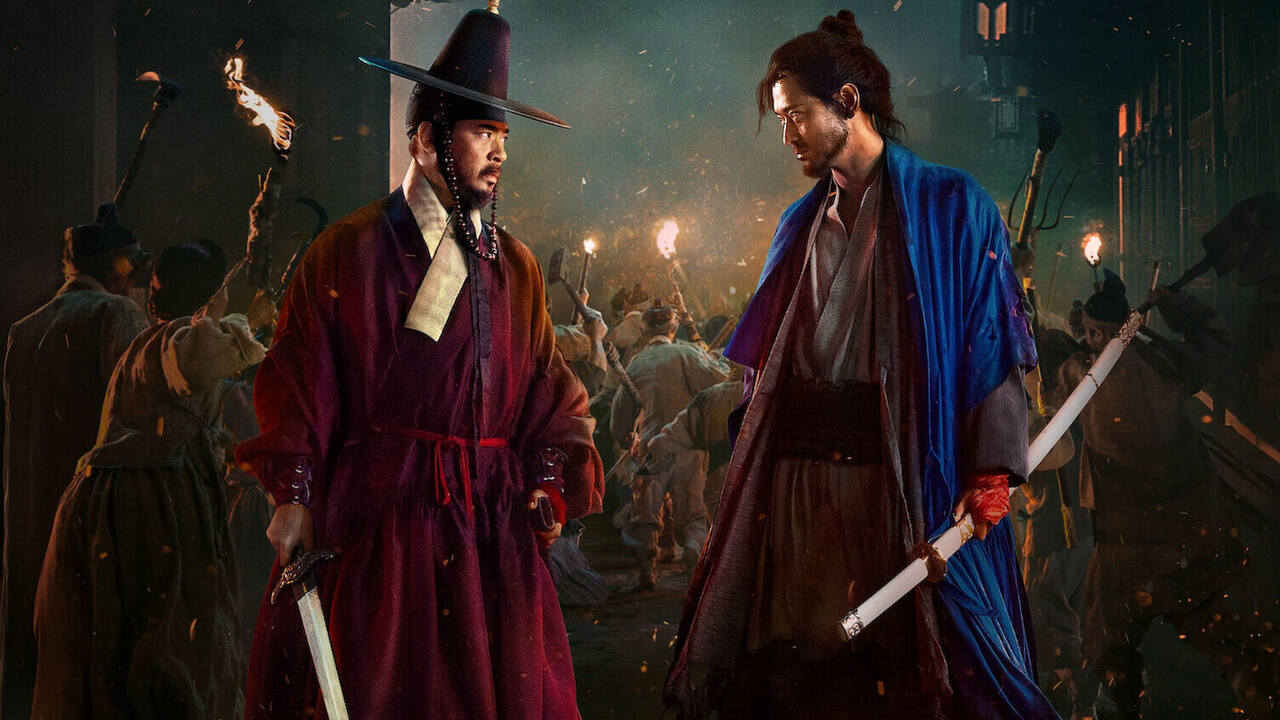
There is good enough drama in Kim Sang-man's Uprising that constantly gets diluted by a lackluster directorial style. Writers Shin Cheol and Park Chan-wook take us to the Joseon Dynasty, where King Seonjo (Cha Seung-won) displays an allergy to equality. A text informs us that the scholar Jeong Yeo-rip asserted that "all people are equal and should have no master." He formed a private community called Great Unity, with a dream that all noblemen and slaves would share food and drink and practice martial arts together. The king doesn't like the idea, so Yeo-rip is accused of treason and besieged by the king's army, leading to him committing suicide. He plunges a sword into his neck - a visual that comes again later in Uprising. This is a story that deals with independence. The slaves don't want to be tethered to their masters - the men and women want to live a free life. During the portions dealing with the Japanese invasion, Seonjo promises independence in exchange for proof that the people have fought for their nation. But Seonjo breaks his promise when the evidence is submitted. He is very unreliable. Cheon Yeong (Gang Dong-won) makes a deal with the king that in place of Jong-ryeo (Park Jeong-min), he would take a test and pass with flying colors, which should guarantee him his freedom. Seonjo first agrees and then backs out of his word after seeing the results. Don't trust Seonjo. Period.
Seonjo's dislike towards a dream that celebrates equality is established almost cartoonishly when he forces one of his men to sit on his royal seat. Cheon Young and Jong-ryeo's friendship is devoid of such hate, such hostility. They meet as kids when the former is assigned as the latter's body servant, which means every time Jong-ryeo performs poorly during his sword fight training, Cheon Young will get whipped. "He's going to be a general. He can't be covered in scars," explains a character to a young Cheon Young. Cheon Young and Jong-ryeo's friendship provides most of the drama to Uprising. They exist in a time when their relationship is often strained by their surroundings. It's affected by misconceptions, half-information, and Seonjo's regressive poison. This alone could have turned the film into a potent drama, and Dong-won and Jeong-min are capable of carrying the dramatic beats to their emotional peak. But Uprising loads more threads into its narrative barrel and then fails to execute them properly. Sang-man doesn't belong to the "show, don't tell" school of filmmaking. He is only concerned with telling.
At one point in the film, someone mentions that the citizens have grown so tired and hungry that they are eating the flesh of dead bodies. The Japanese villain, Genshin (Jung Sung-il), is described as a Nose Snatcher because he cuts the nose of his victims. Why not give us a brief scene depicting these two points? The images would have made the words more convincing. The common people get so annoyed by the exploitative behavior that they burn Seonjo's palace. They also don't appreciate their king's decision to leave them behind during a time when the Japanese army is very near. Uprising never allows us to feel the simmering resentment. We get shots that faintly suggest the citizen's distress, but since the pain is not palpable, we don't experience a sense of wild release or participate in the joy of the rebels. Sang-man sets the film at a swift pace; the scenes pass by so quickly that you don't register any emotion. Beom-dong's (Kim Shin-rok) disagreement with the group is shot like a school debate. Cheon Young's "blue-robed god" name is casually dropped into the film from nowhere. His is a myth that's not developed but simply thrown into the mix without drama, vigor, or effort. Amidst such blandness, the gory violence comes across as a desperate lure to attract the audience. Sang-man seems excited when he shows us severed hands and heads flying in the air. The director displays feelings for sights that deal with mutilations. No wonder the only thing we experience while watching Uprising is the sensation that this whole production is being brutally chopped into various pieces.
Final Score- [3/10]
Reviewed by - Vikas Yadav
Follow @vikasonorous on Twitter
Publisher at Midgard Times
Hi Everyone, after a due consideration, we have decided that we will be open for donations to help us in managing our website. We will be greatful for any kind of amount we receive. Thanks!
— Midgard Times 🎬 (@Moviesr_net) January 4, 2026
PayPal- [email protected] pic.twitter.com/DlNNz5Npm5
Get all latest content delivered to your email a few times a month.
Bringing Pop Culture News from Every Realm, Get All the Latest Movie, TV News, Reviews & Trailers
Got Any questions? Drop an email to [email protected]